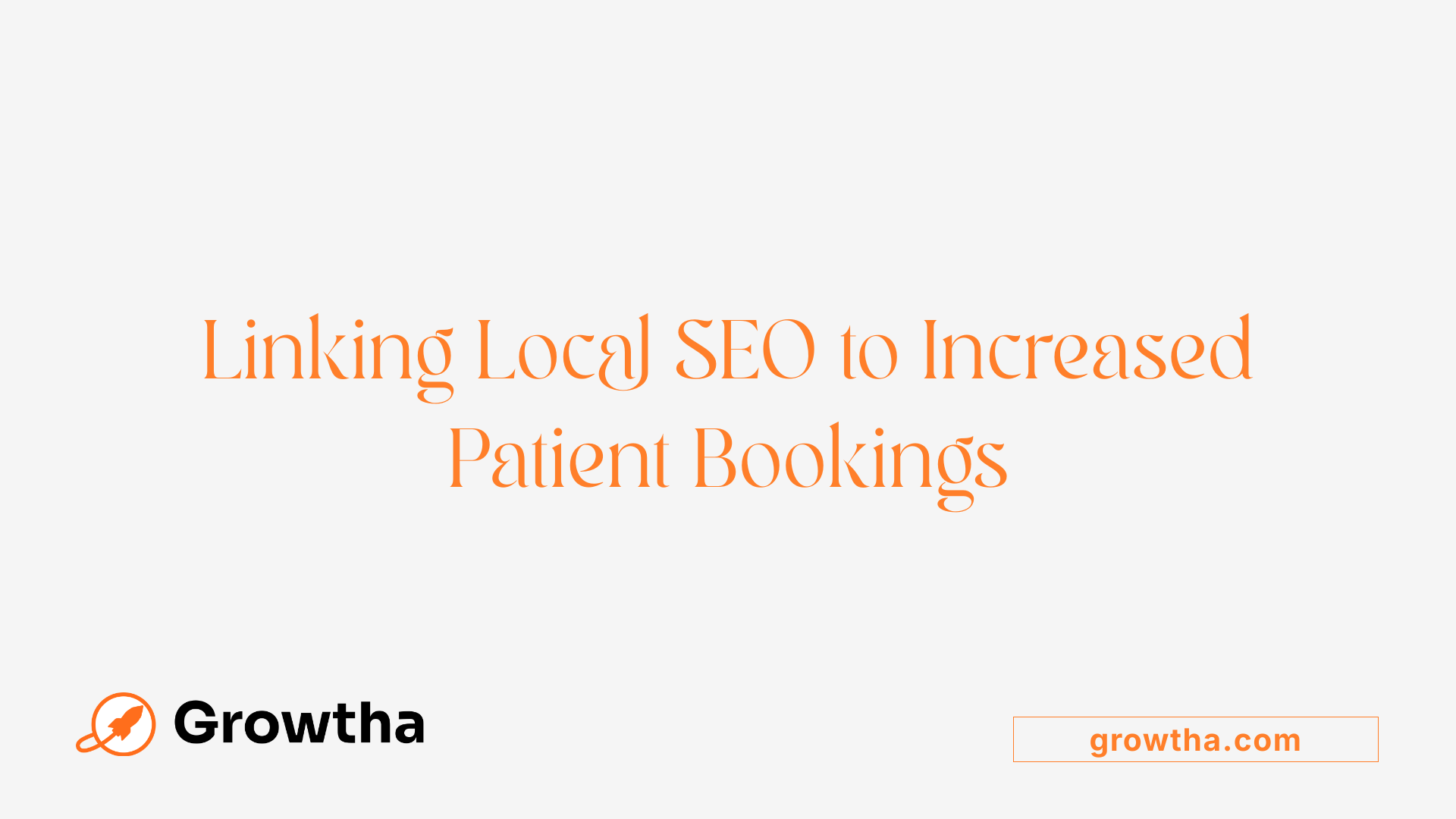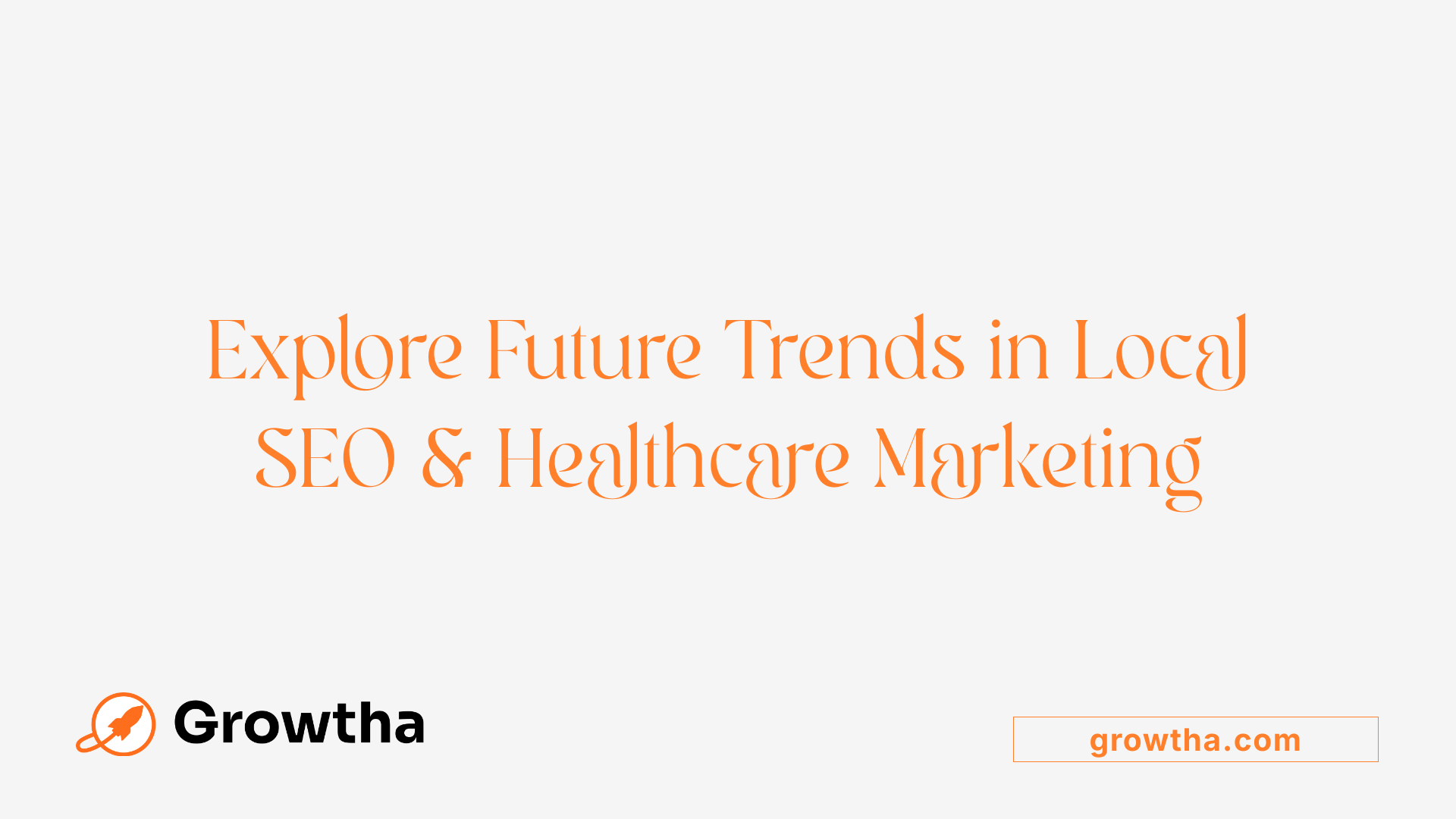In an increasingly digital world, local SEO has emerged as a vital tool for therapy centers seeking to attract nearby patients. By optimizing online presence and reputation, practices can significantly increase their visibility in local search results, leading to more inquiries, appointments, and community engagement. This article explores how local SEO strategies enhance patient acquisition, the methods involved, and the resulting benefits for healthcare providers.

Local search visibility plays a vital role in attracting new patients, especially through searches containing ‘near me’. With the rise of 500% in local searches, it's clear that many people are seeking healthcare providers in their vicinity at the moment of need. Optimizing your practice’s online presence means appearing prominently in local search results, Google Maps, and the Local 3-Pack. When your Google My Business (GMB) profile is complete, with accurate details, high-quality images, and positive patient reviews, it boosts your practice’s authenticity and ranking.
Healthcare providers that focus on improving website speed, mobile friendliness, and relevant local keywords also rank higher, making it easier for potential patients to find them. When your practice appears at the top of local search results, more individuals will click through, increasing inquiries and appointment bookings directly from online searches.
Google Maps and the Local Pack are highly visible search features for local healthcare searches. Appearing in these top slots not only increases visibility but also signals credibility to potential patients. Ranking higher in the Google Local 3-Pack results can increase click-through rates by over 44%, leading to more patient calls, visits, and bookings.
To secure a prime spot in these listings, practices should optimize their Google Business Profiles, ensuring all information is complete and accurate. Engaging actively with patient reviews by responding and encouraging positive feedback also enhances trustworthiness. High-quality, location-relevant content such as blog posts, FAQs, and service pages further supports your ranking in local results.
Patients heavily rely on reviews and local content when choosing healthcare providers. Over 90% of patients read reviews before booking, emphasizing the importance of reputation management. Positive reviews on platforms like Google, Yelp, and Healthgrades build credibility and are a critical factor in local search rankings.
Creating localized content, such as blogs about local health concerns or community health initiatives, helps attract local search traffic. This content establishes your authority and addresses specific patient queries, making your practice more relevant and appealing.
Engaging on social media platforms like Facebook, Instagram, and local forums also increases community visibility and patient trust. Building backlinks from reputable local sources, partnering with community organizations, and participating in local events signal authority and boost your local search rankings.
Strategy Element Impact on Patient Bookings Additional Details Google My Business Optimization High Complete profiles, positive reviews, quality images Local Keywords & Content High Blogs, FAQs, service pages focused on local healthcare topics Reviews & Reputation Management Very High Builds trust, influences review-dependent decisions Local Citations & Backlinks Moderate Reputable local sources increase trust Social Media Engagement Increasing Creates brand trust and community presence
Effective local SEO acts as a catalyst for healthcare practices by increasing visibility, building trust through reviews, and providing targeted content. These efforts make prospective patients more likely to find, consider, and book appointments with your practice, ultimately elevating your community presence and patient intake.

Local SEO offers a range of advantages for healthcare providers seeking to expand their reach within their community. One of the primary benefits is the substantial increase in visibility within local search results and on platforms like Google Maps. When potential patients search for healthcare services nearby, an optimized local SEO strategy helps practices appear prominently, drawing attention to their services.
Optimizing Google Business Profiles, managing positive patient reviews, and keeping consistent Name, Address, and Phone Number (NAP) information across online directories all build a strong online reputation. This sense of credibility and trust encourages prospects to choose a practice over competitors.
Attracting nearby patients is made easier by targeting relevant local keywords and developing location-specific content, such as blogs about community health issues or FAQs tailored to local concerns. This content not only improves search rankings but also directly addresses the needs of the local population, increasing inquiries and appointment bookings.
Compared to paid advertising, local SEO provides a more cost-effective marketing solution. It allows practices to generate ongoing visibility without the recurring expense of ads, making it an efficient investment.
Furthermore, by focusing on community-centered SEO tactics, healthcare practices can foster trust and credibility within their local area. High rankings signal authority and reliability, which are crucial in healthcare, where patient trust is paramount.
Implementing these strategies results in higher patient engagement, improved revenue streams, and a stronger community presence. In essence, local SEO acts as a foundational element that not only enhances discoverability but also solidifies a practice’s reputation and longevity in the local healthcare landscape.

Local SEO plays a crucial role in helping therapy centers and healthcare practices attract nearby patients and turn online interest into actual appointments. It does this primarily by boosting the practice's visibility when potential patients search for healthcare services in their local area.
One of the most effective tools is a well-optimized Google Business Profile. Ensuring the profile contains correct, complete details—such as address, phone number, hours, and services—builds trust. Positive patient reviews and high-quality photos further enhance credibility. When these profiles prominently feature links for easy appointment booking, they encourage patients to take action.
In addition, incorporating location-specific keywords into website content, such as “therapy center in [City]” or “mental health services near me,” improves search relevance. Creating dedicated location pages offers a tailored experience for users and helps search engines understand the practice’s service area.
Adding local citations like online directories and community sites consolidates the center’s online presence, strengthening Google’s trust in the business. Managing reviews proactively—responding to feedback and encouraging satisfied patients to share their experiences—can elevate search rankings and reputation.
Technical website factors like fast loading times, mobile responsiveness, and structured data markup ensure the website is user-friendly and easily discoverable. These technical enhancements improve rankings in local searches and increase user engagement, ultimately leading to more bookings.
In sum, a comprehensive local SEO approach that combines profile optimization, content tailored to location, review management, and technical excellence drives higher visibility and trust. This strategic combination results in more inquiries, higher appointment rates, and a solid patient base from the local community.

Local SEO plays a vital role in shaping the online presence of healthcare providers. One of its major impacts is on reputation management. By actively encouraging patients to leave reviews and responding professionally to feedback, practices can boost their trustworthiness and credibility. High ratings and positive reviews not only attract new patients but also enhance search rankings in local results.
Content marketing is also significantly affected. Creating localized content such as blogs, healthcare guides, and FAQs tailored to specific communities helps in engaging local audiences. This targeted approach answers common patient questions, establishes authority, and improves relevance in local search queries.
Website optimization is another crucial aspect. Incorporating local keywords, maintaining consistent NAP (Name, Address, Phone Number) information across directories, and implementing schema markup related to local business data make the website more visible in local searches. Proper structuring of content around specific geographic areas enables clinics to appear prominently in Google’s Local Pack and map results.
Additionally, managing local citations and earning backlinks from reputable local sources fortifies the website’s authority. This not only enhances visibility but also reinforces the trustworthiness of the practice.
Integrating these strategies fosters stronger community engagement and positions the healthcare practice as a trusted local authority. As a result, patients find it easier to discover and choose the practice, leading to higher appointment bookings and increased foot traffic.
Strategy Area Techniques Benefits Reputation Management Collect and respond to reviews Builds trust, enhances ratings Content Strategy Create localized blogs, FAQs Engages community, targets local search Website Optimization Use local keywords, schema markup Improves local search visibility Citation & Link Building Local citations, backlinks Strengthens authority and rankings

A foundational step in local SEO is claiming and thoroughly optimizing your Google My Business (GMB) profile, now known as Google Business Profile. Ensuring that all details—such as the clinic's name, address, phone number (NAP), operational hours, and services—are accurate and complete helps boost visibility in local searches.
High-quality images, updated service descriptions, and engaging posts also contribute to building trust with potential patients. Regularly managing reviews—by encouraging satisfied patients to leave positive feedback and responding promptly—enhances your profile’s credibility. This ongoing engagement signals to Google that your practice is active and trustworthy, increasing your chances of ranking higher in local results.
Identifying relevant local keywords is essential for reaching the right audience. Use tools like Google Keyword Planner or SEMrush to discover search terms with local modifiers such as “near me,” city names, or neighborhood identifiers.
Integrate these keywords naturally into your website content, meta descriptions, and titles. For example, creating landing pages focused on specific treatments in your locality can improve relevance and ranking for location-based searches. Long-tail keywords, like “child therapy in Downtown Springfield,” attract motivated visitors seeking specific services.
Content that addresses local patient needs builds authority and improves SEO rankings. Regularly publish blog posts, FAQs, and healthcare guides tailored to your community.
Highlight local events, partner with nearby organizations, or share success stories involving your local area. This relevance helps Google understand your practice’s regional focus and increases visibility when potential patients search for nearby healthcare providers.
Establishing consistent citations across reputable local directories, such as Yelp, Healthgrades, and Zocdoc, strengthens Google’s trust in your business profile. Keep all listing information uniform to prevent confusion.
Securing backlinks from local blogs, news outlets, and healthcare organizations signals authority and boosts your search engine rankings. Sponsor community events or participate in local initiatives—these activities often result in backlinks from local websites, further enhancing your local SEO efforts.
Encouraging satisfied patients to leave reviews on Google and other review platforms is crucial. Positive reviews improve your clinic’s local search rankings, increase trustworthiness, and influence patient decisions.
Responding to reviews, both positive and negative, demonstrates engagement and professionalism. Focus especially on prompt responses to reviews received over the weekend or during busy times, as active management indicates a responsive, caring practice.
Implementing schema markup, especially local business schemas, helps search engines better understand your website’s content and location data. This structured data can enhance your appearance in the Local 3-Pack and rich snippets, increasing click-through rates.
Ensure your website is mobile-friendly and loads quickly, as these factors influence search rankings and user experience. Site optimization also includes clear navigation, accessible contact information, and easy-to-use appointment scheduling tools.
Consistently evaluate your local SEO strategies using tools like Google Analytics, Google Search Console, SEMrush, and Moz. These platforms provide insights into traffic sources, keyword performance, and user engagement.
Track your rankings for targeted local keywords and review your GMB insights for visitor interactions. Use this data to refine your content, optimize your profiles, and adjust your backlink strategies, ensuring continuous growth in local search visibility.
Strategy Area Typical Actions Benefits GMB Profile Optimization Complete details, regular review management Increased trust, higher local ranking Local Keyword Research Use local modifiers, long-tail keywords Better targeting, increased relevant traffic Content Development Blog posts, FAQs about local services, community stories Authority building, improved local relevance Citations & Backlinks Listing consistency, backlinks from reputable sources Enhanced trust, higher search engine rankings Review & Reputation Management Encourage reviews, respond actively to feedback Improved credibility, more patient inquiries Technical Website Improvements Schema markup, mobile optimization, fast loading speeds Better ranking, improved user experience Performance Tracking Analytics, insights, ranking reports Data-driven adjustments, continuous growth
Following these comprehensive strategies will help healthcare practices, especially therapy centers and clinics, improve their local search presence. Staying consistent and monitoring results enables ongoing optimization—attracting more local patients and increasing appointment bookings.

Local SEO plays a fundamental role in helping healthcare practices stand out in their community. By focusing on local search strategies, such as optimizing profiles on Google My Business (GMB), clinics can appear prominently in search results when prospective patients look for nearby healthcare options.
One of the most visible features of local SEO is ranking in the Google Local 3-Pack, which displays the top three local results for a query. Positions here typically see over 44% of click-through rates, which directly translates into more patient inquiries, appointments, and foot traffic. Ensuring accurate, complete, and engaging GMB profiles with high-quality images, updated contact details, and service information enhances provider credibility and trustworthiness.
Trust is also built through accumulating positive patient reviews. Over 90% of prospective patients read reviews before selecting a provider, so actively managing and encouraging satisfied patients to share their experiences boosts reputation and search rankings.
In addition, consistent local citations across trusted directories like Yelp, Healthgrades, and Zocdoc strengthen search engine trust. When online listings and reviews are accurate and uniform, Google regards the practice as reliable and authoritative, further elevating visibility.
Content strategies that target local audiences, such as location-specific blogs and healthcare guides, attract relevant web traffic and help position the provider as a community authority. These localized materials enhance relevance in local search results, which improves rankings and encourages community engagement.
Advanced AI tools further support reputation management, review solicitation, and content creation, allowing clinics to respond promptly to reviews, answer common patient questions via chatbots, and stay compliant with privacy laws like HIPAA.
In summary, combining these strategies—profile optimization, review management, localized content, and community interaction—creates a comprehensive approach that not only enhances online visibility but also builds lasting trust with prospective and current patients. This integrated effort ensures healthcare providers are noticed when it matters most, leading to more patient conversions and sustained practice growth.

Optimizing local search visibility is essential for healthcare providers aiming to attract more patients in their community. One of the foundational steps is claiming and optimizing Google My Business (GMB) profiles. This involves ensuring the profile is complete with accurate details like address, phone number, hours, and service offerings. Regularly updating the GMB profile with high-quality images, posts, and responding to reviews helps build trust and engagement.
In addition, incorporating local keywords into website content is critical. Practice pages, blogs, and FAQs should target location-specific phrases such as "family doctor in downtown Springfield" or "pediatrician near me." Creating localized content, like community healthcare guides and local news updates, enhances relevance for local queries.
Active review management is another vital component. Encouraging satisfied patients to share positive reviews on platforms like Google, Yelp, and Healthgrades increases trustworthiness and search rankings. Responding politely to all reviews, addressing concerns, and maintaining consistent NAP (Name, Address, Phone Number) information across all online directories reinforce Google’s confidence in the practice.
Technical website optimizations contribute significantly. A mobile-friendly design with fast load speeds improves user experience and search rankings. Implementing schema markup, especially LocalBusiness schema, helps search engines understand and index the practice’s location details effectively.
Local link building and community engagement further boost authority. Partnering with local blogs, healthcare organizations, or sponsoring community events connects the practice with the community and earns valuable backlinks.
Finally, tracking and analyzing SEO performance through tools like Google Analytics, Search Console, and review management platforms enables providers to adapt strategies. Monitoring key metrics helps identify what works, optimize underperforming areas, and sustain or improve local rankings.
By applying these strategies collectively, healthcare practices can significantly enhance their visibility in local search results, attract more patients, and foster community trust.

Local SEO plays a pivotal role in boosting patient appointments for therapy centers by increasing their visibility where it matters most — within their local community.
Therapy practices that optimize their Google My Business (GMB) profiles with complete, accurate details such as contact information, business hours, and high-quality images are more likely to appear in local search results. Additionally, managing consistent listings across healthcare directories and review sites like Yelp, Healthgrades, and Zocdoc helps build trustworthiness.
Using targeted local keywords and creating location-specific content, such as blogs and FAQ pages, improves relevance for patients searching for nearby therapy options. This targeted approach ensures that practices rank higher in local search queries, Google Maps results, and the Google Local 3-Pack, where over 44% of searchers click.
Encouraging positive patient reviews on trusted platforms also significantly enhances online reputation and trust. With over 90% of patients reading reviews before choosing a provider, a strong review profile can persuade unsure patients to book an appointment.
Furthermore, community engagement through local content, social media geotags, and advertising helps raise awareness and attract inquiries. Regularly monitoring SEO performance with tools like Google Analytics and Search Console allows practices to identify what's working and make necessary adjustments.
All these efforts combined lead to increased online visibility, which directly translates into more patient inquiries and appointments. A well-executed local SEO strategy not only fills appointment slots but also establishes a practice as a trusted community resource, ensuring long-term growth and competitiveness.

The integration of advanced technologies and artificial intelligence (AI) is revolutionizing local healthcare marketing. AI-powered tools now analyze search patterns, user behavior, and review sentiment to tailor content and optimize local SEO strategies more efficiently. Machine learning algorithms help identify trending keywords and optimize website content dynamically, ensuring practices remain competitive.
New AI applications also assist in reputation management by predicting potential negative reviews and suggesting timely responses. Chatbots embedded on healthcare websites enhance patient engagement and collect feedback, which can be utilized to improve local search rankings. These innovations provide healthcare providers with deeper insights, enabling more targeted marketing efforts that attract local patients actively seeking their services.
Voice searches for healthcare questions have surged by over 500%, reflecting changing user behavior. As voice assistants like Siri, Alexa, and Google Assistant become more prevalent, optimizing for voice search will be critical.
Future strategies include focusing on long-tail, conversational keywords and answering specific patient queries succinctly. Implementing natural language processing (NLP) and structured data can help voice assistants directly pull relevant information from a practice’s website or Google My Business profile.
Healthcare providers will need to adapt their content to be more conversational and easily understandable, ensuring their services are discoverable during voice searches in their local areas.
Applying structured data with schema markup enhances how search engines interpret a practice’s online presence. Recent developments include enriched schemas for healthcare organizations, offering details about services, operating hours, accepted insurance, and location.
Utilizing local business schema markup also facilitates the creation of rich snippets, which display star ratings, appointment buttons, and direct contact information in search results. These enhancements improve visibility in local search results and the Google Local 3-pack.
Overall, ongoing advancements aim to make healthcare websites more structured, informative, and trustworthy in the eyes of search engines, directly influencing local ranking positions.
Managing online reviews and reputation is vital. Positive patient reviews boost local SEO rankings, foster trust, and influence new patient decisions. Future approaches include proactive review solicitation and timely responses to patient feedback.
Integrating reviews into marketing includes showcasing testimonials on websites, social media, and in local listings. Using reputation management tools helps monitor reviews across multiple platforms and analyze sentiment trends.
Combining reputation strategies with local SEO efforts not only improves rankings but also builds a credible, patient-centric brand image, which leads to increased inquiries and bookings.
Patients are increasingly using their smartphones and voice assistants for local healthcare searches. They look for nearby clinics, opening hours, and quick answers to health questions.
This shift means healthcare providers must prioritize mobile optimization, fast website performance, and easy-to-navigate sites. Developing content that answers common patient questions in a clear, concise manner aligns with evolving search habits.
Additionally, integrating local keywords, creating targeted service pages, and maintaining consistent NAP (Name, Address, Phone Number) details across platforms are essential.
Ultimately, adapting to these behaviors ensures visible and accessible healthcare services to the growing number of local searchers.
Implementing an all-encompassing local SEO strategy can significantly improve a healthcare practice’s online presence. When practices claim and optimize Google Business Profiles, use local keywords strategically, and produce locally targeted content, they increase their visibility in local search results.
Building solid local citations and engaging actively with online reviews generate trust and authority, which Google favors. Using schema markup enhances listing features, making practices standout.
This visibility translates to more website traffic, higher patient inquiries, and appointments. As competition in healthcare markets intensifies, a comprehensive SEO plan helps practices differentiate themselves and attract a steady stream of local patients.
Tools like Google Analytics, Google Search Console, SEMrush, and Moz are indispensable for tracking SEO success. They provide insights into visitor behavior, keyword performance, and the effectiveness of local SEO tactics.
Regular analysis helps identify areas needing improvement, such as low-performing keywords or pages. Monitoring review trends and engagement levels informs reputation management efforts.
By continually refining strategies based on data, healthcare providers can enhance their online visibility, increase patient engagement, and ultimately generate more bookings and inquiries.
Future growth will lean on backlink building, social media marketing, schema markup, and reputation crisis management. Creating backlinks from reputable local sources signals authority, boosting rankings.
Active social media engagement on platforms like Facebook, Instagram, and community forums helps increase local awareness and patient trust.
Implementing schema markup to highlight services and reviews enhances search result listings. Additionally, preparing for potential reputation crises with swift responses ensures ongoing trust.
Together, these advanced strategies help medical practices maintain high visibility, adapt to search evolution, and attract more local patients over time.
Unlike national campaigns, local SEO targets specific geographical areas. Strategies include claiming and optimizing Google My Business profiles, generating local reviews, and creating location-specific content.
Consistent citations across local directories and engaging with community events or local blogs further strengthen relevance.
This localized approach ensures a healthcare practice appears prominently when potential patients search for nearby healthcare services.
Starting SEO efforts early provides a competitive advantage. Establishing optimized website structures, local citations, and review collection from the beginning increases chances of ranking higher sooner.
This foundational work supports long-term growth as the practice expands its online presence and reputation within the community.
Publishing well-crafted blogs, practice pages, and patient resources showcase expertise and improve search relevance for local queries.
Localized content increases website authority and provides additional value to prospective patients. It helps in ranking for long-tail keywords and builds trust.
Effective content marketing, combined with other SEO tactics, ensures sustained visibility and patient engagement.
Recommended tools include Google Search Console, Google Analytics, SEMrush, Moz, and review management platforms.
These tools help analyze website performance, track keyword rankings, monitor reviews, and identify optimization opportunities.
Using these insights, practices can continuously refine their SEO strategies, improve patient conversion rates, and stay ahead in local search visibility.
Responsive design ensures websites perform well on all devices, especially mobiles, which are primary for local searches. Fast page load speed and intuitive navigation improve user experience.
Search engines favor mobile-friendly websites in rankings. Including structured data like schema markup further enhances visibility.
A seamless user experience encourages visitors to remain longer, increasing the likelihood of appointment bookings.
Schema markup clarifies to search engines what a website’s content represents. For healthcare practices, it highlights services, reviews, hours, and locating information.
Implementing schema enhances listings with rich snippets, which attract more clicks. This visibility can directly impact rankings in local results.
Overall, structured data integration makes a practice’s online presence more informative and trustworthy, supporting sustained local SEO success.
Consistent, accurate citations across local directories and review sites bolster Google’s trust. These placements improve local search rankings and ensure potential patients find reliable contact details.
Participating in community events and linking to local blogs further enhances reputation and relevance.
Regularly updating and verifying citations maintains accuracy and relevance in local search results.
Regular updates, at least quarterly, ensure profiles reflect current services, hours, and contact information. Consistent review management, including encouraging satisfied patients to leave reviews, keeps reputation positive.
Monitoring reviews helps address negative feedback promptly, mitigating potential reputation damage.
Maintaining active profiles and review engagement sustains and improves local SEO performance, leading to ongoing patient inquiries.
This evolving landscape of local healthcare SEO requires healthcare providers to stay adaptable, embracing new technologies and strategies. By focusing on user experience, authoritative content, and active reputation management, practices can secure a leading position in local search results and attract more patients seeking nearby healthcare options.
Harnessing the power of local SEO is essential for therapy centers aiming to grow their patient base, enhance community trust, and stay competitive. By implementing comprehensive strategies—such as optimizing Google Business Profiles, fostering positive reviews, creating localized content, and building reputable backlinks—practices can significantly increase their visibility in local search results. This increased online presence facilitates higher patient inquiries, conversions, and ultimately, a boost in appointments. As technology advances, embracing emerging tools like AI, voice search, and structured data will further amplify these efforts. Continuous monitoring and adaptation of local SEO strategies are crucial to maintaining and improving search rankings. In a community-focused healthcare environment, effective local SEO not only attracts more patients but also benefits public health by making essential therapy services more accessible to those who need them most.